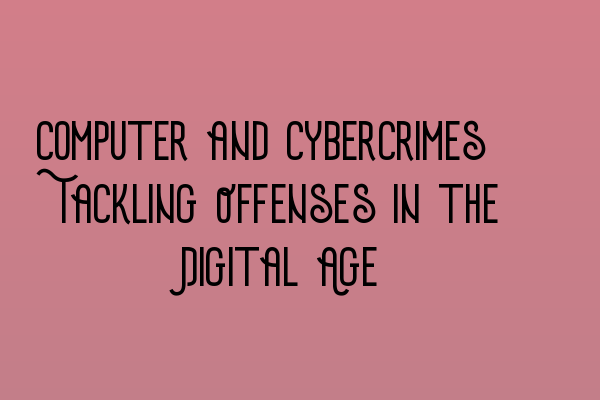Computer and Cybercrimes: Tackling Offenses in the Digital Age
In today’s digital age, computer and cybercrimes have become a significant concern for individuals, businesses, and governments alike. With the rapid advancements in technology and the widespread use of the internet, criminals have found new ways to exploit vulnerabilities and commit offenses in the cyber realm.
The Impact of Computer and Cybercrimes
Computer and cybercrimes encompass a wide range of offenses that involve the use of computers, networks, and the internet. These offenses can have severe consequences for both individuals and society as a whole. From financial fraud and identity theft to hacking and online harassment, cybercriminals are constantly adapting their methods to exploit weaknesses and profit from their actions.
The impact of computer and cybercrimes is far-reaching. Individuals may suffer financial loss, emotional distress, and damage to their reputation as a result of being a victim of cybercrime. Businesses face the risk of data breaches, intellectual property theft, and disruption to their operations, which can potentially lead to significant financial losses. Governments must also contend with the threats posed by cybercriminals, as they can target critical infrastructures and compromise national security.
Tackling Computer and Cybercrimes
As computer and cybercrimes continue to evolve and grow in sophistication, it is crucial for law enforcement agencies, legal professionals, and individuals to stay up to date with the latest developments and trends in this field. This enables them to effectively tackle and prevent cyber offenses.
Legal Frameworks and Legislation
A strong legal framework and legislation play a vital role in combating computer and cybercrimes. Governments around the world are enacting and updating laws to address the challenges posed by cybercriminals. These laws provide the necessary tools and provisions to investigate, prosecute, and punish offenders engaging in cyber activities.
For aspiring solicitors, it is essential to have a comprehensive understanding of the legal frameworks and legislation surrounding computer and cybercrimes. The Solicitors Qualifying Examination (SQE) is an important step in the process of becoming a qualified solicitor in the UK. It tests candidates’ knowledge and understanding of various areas of law, including criminal law and practice.
If you are preparing for the SQE, it is crucial to have access to essential study materials to enhance your chances of success. Check out this article on SQE Exam Prep: Essential Study Materials for Aspiring Solicitors for valuable resources to aid your preparation.
Technology and Digital Forensics
In the fight against computer and cybercrimes, technology and digital forensics play a crucial role in identifying and gathering evidence against perpetrators. The development of specialized tools and techniques helps law enforcement agencies and legal professionals investigate digital crimes and reconstruct digital footprints left by offenders.
Challenges and Success Strategies
Tackling computer and cybercrimes comes with its own set of challenges. The constantly evolving nature of technology means that cybercriminals can quickly adapt and find new ways to exploit vulnerabilities. Legal professionals need to stay ahead of these challenges by continuously updating their knowledge and skills.
International lawyers seeking to qualify as solicitors in the UK also face unique challenges in preparing for the SQE. Understanding the format and requirements of the examination is crucial for success. To demystify the Solicitors Qualifying Examination format and gain valuable insights, read this informative article on Demystifying the Solicitors Qualifying Examination Format.
For entrepreneurs in the UK, forming a Limited Liability Company (LLC) is a popular choice. However, it is important to understand the process and requirements involved. To simplify the LLC formation journey, refer to this step-by-step guide on LLC Formation Made Simple: Step-by-Step Guide for UK Entrepreneurs.
Collaborative Efforts and Education
Tackling computer and cybercrimes requires collaborative efforts between various stakeholders. Governments, law enforcement agencies, legal professionals, technology experts, and the general public must work together to create awareness, share information, and implement effective strategies to combat cyber offenses.
Education also plays a crucial role in preventing and addressing computer and cybercrimes. Raising awareness among individuals about the risks and consequences of cyber offenses can help them better protect themselves and their digital assets.
Conclusion
Computer and cybercrimes pose significant challenges in the digital age. To effectively tackle these offenses, a multi-faceted approach is needed. Strengthening legal frameworks, improving technological capabilities, and promoting education and collaboration are key components in the fight against cybercriminals.
By staying informed, continuously updating skills, and leveraging the available resources, legal professionals can play a vital role in combating computer and cybercrimes. Together, we can contribute to creating a safer digital environment for individuals, businesses, and society as a whole.
